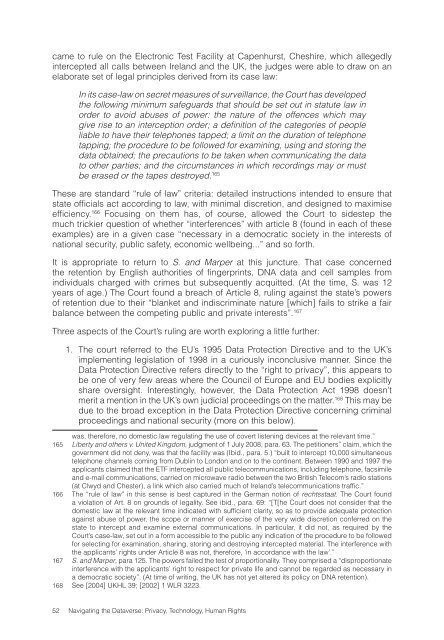Navigating the Dataverse: Privacy, Technology ... - The ICHRP
Navigating the Dataverse: Privacy, Technology ... - The ICHRP
Navigating the Dataverse: Privacy, Technology ... - The ICHRP
Create successful ePaper yourself
Turn your PDF publications into a flip-book with our unique Google optimized e-Paper software.
came to rule on <strong>the</strong> Electronic Test Facility at Capenhurst, Cheshire, which allegedly<br />
intercepted all calls between Ireland and <strong>the</strong> UK, <strong>the</strong> judges were able to draw on an<br />
elaborate set of legal principles derived from its case law:<br />
In its case-law on secret measures of surveillance, <strong>the</strong> Court has developed<br />
<strong>the</strong> following minimum safeguards that should be set out in statute law in<br />
order to avoid abuses of power: <strong>the</strong> nature of <strong>the</strong> offences which may<br />
give rise to an interception order; a definition of <strong>the</strong> categories of people<br />
liable to have <strong>the</strong>ir telephones tapped; a limit on <strong>the</strong> duration of telephone<br />
tapping; <strong>the</strong> procedure to be followed for examining, using and storing <strong>the</strong><br />
data obtained; <strong>the</strong> precautions to be taken when communicating <strong>the</strong> data<br />
to o<strong>the</strong>r parties; and <strong>the</strong> circumstances in which recordings may or must<br />
be erased or <strong>the</strong> tapes destroyed. 165<br />
<strong>The</strong>se are standard “rule of law” criteria: detailed instructions intended to ensure that<br />
state officials act according to law, with minimal discretion, and designed to maximise<br />
efficiency. 166 Focusing on <strong>the</strong>m has, of course, allowed <strong>the</strong> Court to sidestep <strong>the</strong><br />
much trickier question of whe<strong>the</strong>r “interferences” with article 8 (found in each of <strong>the</strong>se<br />
examples) are in a given case “necessary in a democratic society in <strong>the</strong> interests of<br />
national security, public safety, economic wellbeing...” and so forth.<br />
It is appropriate to return to S. and Marper at this juncture. That case concerned<br />
<strong>the</strong> retention by English authorities of fingerprints, DNA data and cell samples from<br />
individuals charged with crimes but subsequently acquitted. (At <strong>the</strong> time, S. was 12<br />
years of age.) <strong>The</strong> Court found a breach of Article 8, ruling against <strong>the</strong> state’s powers<br />
of retention due to <strong>the</strong>ir “blanket and indiscriminate nature [which] fails to strike a fair<br />
balance between <strong>the</strong> competing public and private interests”. 167<br />
Three aspects of <strong>the</strong> Court’s ruling are worth exploring a little fur<strong>the</strong>r:<br />
1. <strong>The</strong> court referred to <strong>the</strong> EU’s 1995 Data Protection Directive and to <strong>the</strong> UK’s<br />
implementing legislation of 1998 in a curiously inconclusive manner. Since <strong>the</strong><br />
Data Protection Directive refers directly to <strong>the</strong> “right to privacy”, this appears to<br />
be one of very few areas where <strong>the</strong> Council of Europe and EU bodies explicitly<br />
share oversight. Interestingly, however, <strong>the</strong> Data Protection Act 1998 doesn’t<br />
merit a mention in <strong>the</strong> UK’s own judicial proceedings on <strong>the</strong> matter. 168 This may be<br />
due to <strong>the</strong> broad exception in <strong>the</strong> Data Protection Directive concerning criminal<br />
proceedings and national security (more on this below).<br />
was, <strong>the</strong>refore, no domestic law regulating <strong>the</strong> use of covert listening devices at <strong>the</strong> relevant time.”<br />
165 Liberty and o<strong>the</strong>rs v. United Kingdom, judgment of 1 July 2008, para. 63. <strong>The</strong> petitioners” claim, which <strong>the</strong><br />
government did not deny, was that <strong>the</strong> facility was (Ibid., para. 5.) “built to intercept 10,000 simultaneous<br />
telephone channels coming from Dublin to London and on to <strong>the</strong> continent. Between 1990 and 1997 <strong>the</strong><br />
applicants claimed that <strong>the</strong> ETF intercepted all public telecommunications, including telephone, facsimile<br />
and e-mail communications, carried on microwave radio between <strong>the</strong> two British Telecom’s radio stations<br />
(at Clwyd and Chester), a link which also carried much of Ireland’s telecommunications traffic.”<br />
166 <strong>The</strong> “rule of law” in this sense is best captured in <strong>the</strong> German notion of rechtsstaat. <strong>The</strong> Court found<br />
a violation of Art. 8 on grounds of legality. See ibid., para. 69: “[T[he Court does not consider that <strong>the</strong><br />
domestic law at <strong>the</strong> relevant time indicated with sufficient clarity, so as to provide adequate protection<br />
against abuse of power, <strong>the</strong> scope or manner of exercise of <strong>the</strong> very wide discretion conferred on <strong>the</strong><br />
state to intercept and examine external communications. In particular, it did not, as required by <strong>the</strong><br />
Court’s case-law, set out in a form accessible to <strong>the</strong> public any indication of <strong>the</strong> procedure to be followed<br />
for selecting for examination, sharing, storing and destroying intercepted material. <strong>The</strong> interference with<br />
<strong>the</strong> applicants’ rights under Article 8 was not, <strong>the</strong>refore, ‘in accordance with <strong>the</strong> law’.”<br />
167 S. and Marper, para 125. <strong>The</strong> powers failed <strong>the</strong> test of proportionality. <strong>The</strong>y comprised a “disproportionate<br />
interference with <strong>the</strong> applicants’ right to respect for private life and cannot be regarded as necessary in<br />
a democratic society”. (At time of writing, <strong>the</strong> UK has not yet altered its policy on DNA retention).<br />
168 See [2004] UKHL 39; [2002] 1 WLR 3223.<br />
52 <strong>Navigating</strong> <strong>the</strong> <strong>Dataverse</strong>: <strong>Privacy</strong>, <strong>Technology</strong>, Human Rights
















